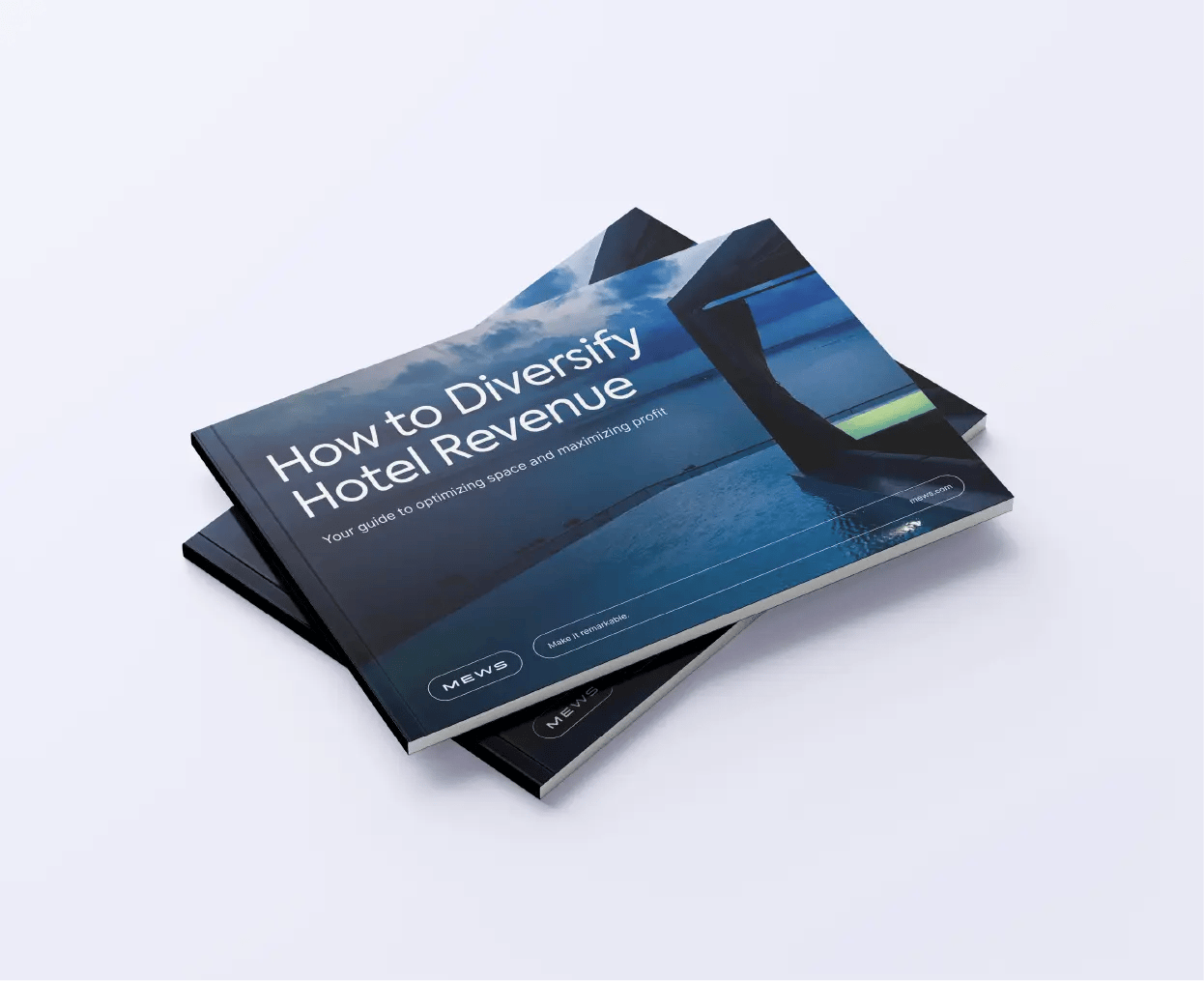What are hotel direct bookings?
Direct bookings happen when a guest reserves a room directly with your hotel – whether that’s through your website, by phone, email, or as a walk in. Online direct bookings are often powered by a booking engine that is integrated into your hotel’s website, making the process fast, seamless and secure for guests. The real challenge lies in getting guests to book through your website, rather than through OTAs – we will look at some effective strategies below.

Benefits of direct bookings for hotels
Direct bookings offer numerous advantages for hotels, from increasing revenue to fostering stronger relationships with guests.
Keep profit margins high
All hoteliers know that profit margins are often sacrificed to hefty commission fees from metasearch sites and OTAs. By taking away the middleman, you can keep profit margins high – and instead of giving away your revenue to third parties – offer better prices to your guests.
Have more control over the guest experience
When guests book through third parties, you have no control over the communication they receive, and you can’t control the guest relationship in any way. Direct bookings allow you to take charge, ensuring consistent, personalized messaging across all stages – from booking confirmation and pre-arrival communication to in-stay updates and post-stay follow-ups. This end-to-end connection helps create a memorable and seamless guest experience.
Makes upselling easier
With direct bookings, communication isn’t just clearer—it also opens up opportunities for upselling. By integrating upsells into the booking process, you can smoothly encourage guests to add services like room upgrades, parking, or special packages. When upselling is seamlessly woven into the booking journey, it feels natural for guests, making it easier to drive additional revenue and enhance their overall experience.
Foster loyalty
When guests book directly, fostering loyalty becomes easier. You can encourage them to join your loyalty program and capture all the necessary details to personalize future communications, increasing the chances of repeat bookings and building a lasting connection with your brand.

Differences between OTAs and direct bookings
Both Online Travel Agencies (OTAs) and direct bookings have their pros and cons. Successful hotels often combine both strategies to boost occupancy and revenue, with a focus on increasing direct bookings to positively impact their bottom line.
The two models differ significantly. OTAs charge commission fees, while direct bookings allow hotels to keep the full revenue. With direct bookings, hotels can manage guest relationships directly, tailoring marketing efforts to specific guest segments.
OTAs offer guests the convenience of comparing options, but direct bookings, once a guest is interested, often provide better rates and a more personalized experience throughout the booking journey.
How to increase direct bookings in your hotel
Now, the million-dollar question, how can your hotel increase direct bookings?
Content marketing and SEO
Content marketing and SEO, when done right, is one of the most effective ways to drive direct bookings. By creating engaging blog posts based on keywords your audience is searching for, you increase your visibility and draw in organic traffic. With content tailored to relevant keywords, your blog or website becomes a consistent resource, boosting the chances of turning visits into bookings over time. It’s a long-term strategy that pays off by building trust and keeping your property top of mind.
Social media
Social media, whether through paid ads or organic posts, offers a powerful channel to promote direct bookings. Through engaging posts, exclusive offers, and targeted campaigns, you can inspire direct bookings while showcasing your brand’s unique appeal. Social media keeps your property visible, connecting with past, present, and future guests to stay front-of-mind and build a loyal following.
Exclusive offers
Creating exclusive offers for guests who book directly can be a great incentive. Special packages, discounts, or unique perks like free breakfast, early check-in, or room upgrades encourage guests to choose direct booking. You can also leverage seasonal offers around local events, holidays, or low seasons to boost direct bookings and stand out from competitors.
Best price
Offering a best price guarantee is a strong way to encourage direct bookings. By promising to match any lower price guests find elsewhere, you instill confidence that they’re getting the best deal by booking with you. This assurance shows guests that you value their business and want to provide the most value.
Launch a loyalty program
Loyalty programs can inspire repeat direct bookings by rewarding guests for their loyalty. Consider offering points, special discounts, or even free nights for every night they book directly. Building a lasting relationship with guests increases the likelihood of them returning and choosing to book directly in the future.
Optimize your website for conversions
A seamless website experience is essential for converting visitors into bookings. Ensure your site loads quickly and is optimized for both mobile and desktop, making it easy for guests to book at any time. A smooth, intuitive booking process with an integrated booking engine can make booking a room hassle-free and encourage direct reservations.
Practice reputation management
Managing your online reputation is key for attracting direct bookings, as positive reviews build trust and credibility. By showcasing strong reviews, you boost confidence among potential guests who may be new to your brand. It’s also crucial to respond to all reviews – positive and negative – showing guests that you care about their experience. The more you demonstrate commitment to excellence, the more likely guests are to book directly.

Common challenges of direct bookings and how to overcome them
There are many challenges when it comes to driving direct bookings, but there are also some key solutions to overcome them. Let’s take a look.
Visibility
With OTAs like Booking.com and Expedia, which have huge marketing budgets, it’s hard to compete for visibility in search engines. These OTAs also offer a great user experience, are trustworthy brands, and have loyalty programs that allow users to earn points when booking on their sites. This can make it challenging for hotels to attract direct bookings.
Solution:
Investing in SEO to help your brand rank higher organically is a strong start, but also consider SEM (search engine marketing) to boost your brand’s visibility. While competing directly with OTAs and metasearch giants may be tough, the higher you position in search results, the better. Focus on improving your local search results through your Google Business Profile, and don’t overlook social media – it can be a powerful tool to enhance your brand’s presence and visibility.
Low budgets
Visibility is closely tied to budget. OTAs and metasearch giants have substantial marketing funds, making it difficult for hotels to compete for visibility and reach.
Solution:
Optimize your SEO strategy by focusing on long-tail keywords. By creating content around specific, less competitive keywords, you can attract organic traffic without competing directly with OTAs. Targeting niche audiences also lets you concentrate your budget on reaching a smaller, more defined group likely to book directly.
Consider implementing a referral program that rewards loyalty members for each new guest they refer who books directly. You can also partner with influencers, bloggers, and local guides to promote your hotel to their audiences, creating a compound effect that helps drive visibility and bookings.
Trust
OTAs and metasearch engines have invested heavily in branding, making it challenging for individual hotels to be perceived as equally trustworthy. They also offer the convenience of comparing prices and hotels in one place, which can attract guests.
Solution:
Build trust on your website by showcasing certifications, partnerships, awards, and customer reviews prominently. Ensure that your booking experience is mobile-friendly and easy to use to reduce the likelihood of website abandonment. The smoother the booking process, the more likely guests are to complete their reservation and consider booking directly in the future.
Pricing strategies
Pricing is a complex but critical decision for hotels. While rate parity maintains consistency across channels, it can reduce the incentive for guests to book directly.
Solution:
Encourage direct bookings by offering perks such as free upgrades, exclusive discounts, special amenities, or early check-in for guests who book on your site. A best price guarantee can also be effective, though additional perks can further differentiate your site and make booking directly more attractive, especially if you’re already maintaining rate parity.

Best technologies to support direct bookings
With so many technologies available, it can be challenging to identify which tools are essential for your direct booking strategy. Below are some key tools to consider.
Booking engine and Property Management System
To support direct bookings, ensure your website has a booking engine integrated with your Property management system so you can manage bookings seamlessly across the customer journey. Look for a PMS that integrates smoothly with your booking engine and channel manager for a streamlined experience.
Channel manager
A channel manager is essential for promoting direct bookings and synchronizing availability and rates to avoid overbookings. This tool helps you manage bookings across multiple channels and increase exposure while maintaining consistency.
Chatbots
Chatbots provide instant responses to potential guests, helping to reduce website abandonment by keeping visitors engaged. Set your chatbot to send automated messages if the chat goes idle or if the guest navigates away, ensuring they receive prompt attention throughout the booking process.
Analytics tools
A direct booking strategy is incomplete without analytics tools to monitor guest behavior on your website. By analyzing user interactions, you can identify areas to improve and optimize conversion rates.
Secure payment processing
A secure, integrated payment gateway is essential to process online payments easily. This allows guests to pay at the time of booking, eliminating payment concerns upon arrival. A smooth, secure payment process is a crucial part of the direct booking experience.
Conclusion
This guide has explored strategies to increase direct bookings, from overcoming challenges to leveraging essential technologies. By emphasizing a balanced channel mix and focusing on direct bookings, your hotel can boost profits, build loyalty, and create a seamless guest experience.
While competing with OTAs and metasearch sites presents challenges, a well-rounded approach—including competitive pricing and trust-building marketing—will help foster stronger customer relationships, enhance loyalty, and increase profitability.
Download our guide How to Diversify Hotel Revenue











